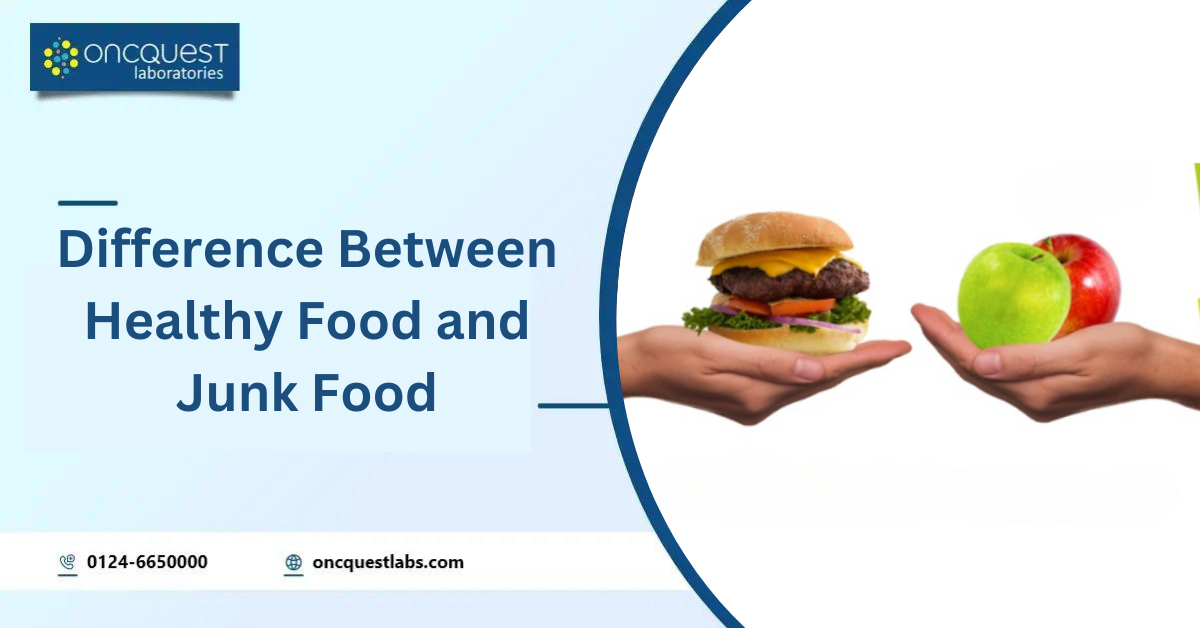We’re here to guide you in making healthier choices for the upcoming year, aiming to make it your best yet.
Our modern lives move quickly, and the food we choose has a big impact on how we feel and live. Knowing the difference between healthy and unhealthy foods is important for making smart choices about what we eat.
Contents
- 1 Why Food Choice is Important?
- 2 What is Healthy Food, and what is Junk Food?
- 3 Defining Healthy Food in Detail
- 4 Defining Junk Food in Detail
- 5 Health Effects of Healthy Food
- 6 On the other hand, the health effects of consuming junk food can be detrimental:
- 7 How Can Junk Food Be Avoided?
- 8 Conclusion
- 9 Frequently asked questions
Why Food Choice is Important?
The food we eat directly impacts how our bodies and minds feel. Choosing healthy foods can improve our health, give us more energy, and help prevent long-term health issues. On the other hand, eating unhealthy foods can cause health problems and make us feel tired and sluggish.
Think of our bodies like an ecosystem. Just like a healthy environment needs good things to thrive, our bodies need nutritious foods to function well. When we eat nutritious foods, our bodies get the right fuel to produce energy and support our overall well-being.
However, if we consume unhealthy foods regularly, it’s like giving our bodies poor-quality fuel. This can lead to health issues and lower energy levels over time. Our bodies work hard to turn the food we eat into energy, so it’s essential to choose foods that nourish and support us.
To make better food choices, it’s important to understand what types of foods are healthy and provide the nutrients our bodies need to stay strong and healthy.
What is Healthy Food, and what is Junk Food?
You can divide food into two main categories: healthy food and junk food. Healthy food gives our bodies essential nutrients like vitamins, minerals, and energy, helping us stay strong and healthy. On the other hand, junk food is usually packed with calories, fats, sugars, and salts but lacks important nutrients.
Here’s a simple way to tell them apart without needing a big nutrition book:
Healthy food includes fruits, vegetables, whole grains, lean proteins like chicken or fish, and low-fat dairy products. These foods give us energy, help our muscles grow, and keep our bodies working well.
Junk food, on the other hand, is stuff like fast food, sugary snacks, fried foods, and sodas. These foods taste good but often have too much unhealthy stuff like fats, sugars, and salt, which can cause health problems if eaten too much.
So, before eating, think about whether your food is giving you good stuff like vitamins and energy, or if it’s just loaded with unhealthy things that can make you feel sluggish or cause health issues.
Defining Healthy Food in Detail
Healthy food is defined by its abundance of essential macronutrients (carbohydrates, proteins, and fats) and micronutrients (vitamins and minerals) necessary for the body to function properly. These foods are often whole, unprocessed, and devoid of artificial additives, promoting overall health and well-being.
The characteristics of healthy food include being rich in nutrients such as vitamins, minerals, fiber, and antioxidants, all of which play crucial roles in supporting bodily functions, boosting the immune system, and protecting against diseases. They are also low in unhealthy fats, sugars, and sodium, helping to maintain a balanced diet and reduce the risk of chronic health issues like heart disease and diabetes. Furthermore, healthy foods are minimally processed, preserving their natural nutritional value and avoiding the addition of harmful chemicals or preservatives.
Examples of nutrient-rich foods that are considered healthy include fresh fruits and vegetables, whole grains like brown rice and quinoa, lean proteins such as fish and skinless poultry, and plant-based sources like legumes and nuts. Incorporating these foods into your diet regularly can contribute to better health, increased energy levels, and improved overall quality of life.
Defining Junk Food in Detail
Healthy food is characterized by its abundance of essential macronutrients and micronutrients necessary for proper bodily functions. It is typically whole, unprocessed, and devoid of artificial additives, offering a wealth of benefits for overall health.
Key Characteristics of Healthy Food:
1. High Nutrient Content: Healthy foods are rich in vitamins, minerals, fiber, and antioxidants, promoting optimal health and well-being.
2. Low in Unhealthy Components: They are low in unhealthy fats, sugars, and sodium, reducing the risk of health issues like obesity, heart disease, and high blood pressure.
3. Minimally Processed: Healthy foods are often whole and minimally processed, preserving their natural nutritional value and minimizing the addition of harmful additives.
Examples of Nutrient-Rich Foods:
1. Fresh fruits and vegetables: These provide essential vitamins, minerals, fiber, and antioxidants crucial for good health.
2. Whole grains: Foods like brown rice, quinoa, and whole wheat are rich in fiber, vitamins, and minerals, supporting digestive health and overall well-being.
3. Lean proteins: Fish, chicken, beans, and legumes are excellent sources of protein, essential amino acids, and nutrients vital for muscle growth and repair.
On the other hand, junk food is typically highly processed and loaded with excessive calories, unhealthy fats, sugars, and sodium, while lacking essential nutrients.
Key Characteristics of Junk Food:
1. High Caloric Content: Junk foods are calorie-dense, contributing to weight gain and health problems when consumed excessively.
2. Unhealthy Components: They contain high levels of unhealthy fats (like trans fats), sugars, and salt, increasing the risk of obesity, diabetes, and heart disease.
3. Highly Processed: Junk foods undergo extensive processing, leading to the loss of nutritional value and the addition of artificial additives and preservatives.
Examples of Common Junk Foods:
1. Fast food items such as burgers, fries, and fried chicken: These are high in unhealthy fats, sodium, and calories.
2. Sugary drinks and snacks: Sodas, candies, and sweetened beverages are loaded with sugar, contributing to weight gain and dental issues.
3. Processed snacks: Chips, cookies, and packaged snacks often contain unhealthy fats, sugars, and artificial additives, lacking essential nutrients.
Making informed food choices by opting for nutrient-rich foods and minimizing the consumption of junk foods is essential for maintaining optimal health and well-being.
Health Effects of Healthy Food
Choosing a balanced and nutritious diet has numerous benefits for overall health and well-being. Here are some key positive effects of maintaining such a diet:
1. Balanced Nutrition: A balanced diet provides essential nutrients, promoting enhanced energy levels and overall health.
2. Reduced Risk of Chronic Diseases: Consuming nutritious foods lowers the risk of chronic illnesses like heart disease and diabetes.
3. Improved Mental Health: Nutrient-rich foods contribute to improved mental well-being and mood stability.
4. Long-term Positive Impacts: Following a balanced diet leads to longer life expectancy, better quality of life, and reduced healthcare costs.
On the other hand, the health effects of consuming junk food can be detrimental:
1. Short-term and Long-term Health Risks: Junk food consumption can cause immediate effects like fatigue and indigestion, while long-term risks include obesity, heart disease, and diabetes.
2. Connection to Chronic Diseases: Junk food is directly linked to conditions such as hypertension, cardiovascular diseases, and certain types of cancer.
Therefore, making healthy food choices is crucial for maintaining optimal health and preventing chronic health issues associated with poor dietary habits.
How Can Junk Food Be Avoided?
Being mindful of our food choices is crucial. Planning meals, cooking at home, and understanding food labels can greatly reduce junk food intake. For instance, swapping deep-fried breakfast and tea snacks with healthier options like peanuts, chickpeas, or low-calorie khakhras can have a positive impact. Limiting dining out can also support healthier eating habits.
Moderation plays a key role; occasional indulgence is fine, but it shouldn’t become a daily habit. It’s essential to recognize the difference between healthy and junk food to enhance overall health and quality of life. These changes aren’t just about short-term benefits but about long-term well-being and vitality. Making informed choices and adopting healthier eating practices are investments in our health and happiness.
Conclusion
In conclusion, the disparity between healthy food and junk food is stark, impacting both physical and mental well-being. While healthy foods provide essential nutrients, energy, and support overall health, junk foods offer little nutritional value and contribute to various health issues. Making informed dietary choices is crucial for promoting longevity and vitality.
Frequently asked questions
Q1: What is the difference between healthy food and diet food?
A1: Healthy food focuses on providing essential nutrients and promoting overall well-being, while diet food often emphasizes calorie restriction or specific macronutrient ratios for weight management.
Q2: What is difference between junk food and fast food?
A2: Junk food refers to unhealthy, highly processed foods high in calories, sugars, fats, and sodium, lacking nutritional value. Fast food, on the other hand, refers to a type of convenience food that is often prepared and served quickly in restaurants, typically including items like burgers, fries, and fried chicken, which can also fall under the category of junk food due to their high calorie and fat content.
Q3: What is the difference between junk food and high quality food?
A3: Junk food is often processed, high in unhealthy fats, sugars, and salt, lacking essential nutrients. High-quality food, on the other hand, is nutrient-rich, minimally processed, and provides a variety of vitamins, minerals, and antioxidants beneficial for overall health and well-being.





